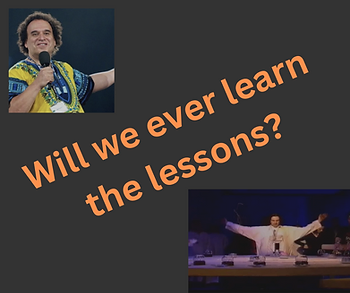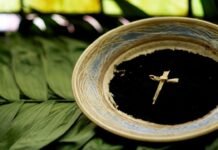The publication of the Scolding Report last week has sent many a survivor into the proverbial ‘hole’, as they relive their own experiences of abuse in a spiritual context.
Every report, review and revelation causes them to question again whether there was anything more they could have done to stop their abuse or convince others they were telling the truth. It is painful and disorientating and it is only made worse by the realisation that once again the reviewers are only recommending that processes rather than people change.
According to the Executive Summary, Fiona Scolding KC was given the job of looking at, “…how Mr Pilavachi’s conduct was enabled, contributed to, dependent upon, or produced by, the wider culture of both Soul Survivor and the Charismatic movement and the Church of England in general.”
It sounded promising.
There are twenty pages describing Pilavachi’s inappropriate relationships, his manipulative and controlling behaviour, his ghosting, wrestling and massages, alongside numerous safeguarding failures. It even acknowledges that:
“Those who were most affected by Mr Pilavachi’s behaviour have been profoundly hurt by it, and it has had consequences for their mental health, their lives (including their employment), their relationships with their partners and families and their sense of self-worth. Many people – who outwardly would seem successful and resilient – have described themselves as “broken” by the experience.” (p45)
There are thirty-four pages, outlining some of the cultural issues that enabled this abuse. The power dynamics of a charismatic, founding, celebrity leader (p5O-3), and the blurred boundaries and informality of relationships (p53) played their part but Scolding is clear that the trustees of the different Ministries failed (p61), as the Chair of Soul Survivor Ministries, Bishop Graham Cray didn’t take reports of abuse seriously enough (p61-62). Furthermore, the Bishop of St Alban’s, Rt Revd Alan Smith ordained Pilavachi without him completing the usual selection or training process and gave inadequate oversight to the church after it became a Bishops’ Mission order (BMO) (p71-73, p88).
Yet, after all that, the recommendations (p87-94) are tired and toothless.
The best that the survivors are offered is the suggestion that an apology might be helpful, and yet another list of ways that processes should be followed or improved. It has all been said before – and it has all been ignored before, as journalist Gavin Drake pointed out this week on X:

And he should know – Drake has been reporting on these cases of abuse in a spiritual context for decades, including the Nine O’Clock Service at St Thomas’ Church in Crookes, Sheffield.
Back in the late 1980s and early 1990s, Chris Brain was the darling of the Church of England. He led the Nine O’Clock Service (NoS), youth-orientated worship service, a ‘fresh-expression’ before Fresh Expressions were a thing.
NoS began after a visit to the UK from Vineyard leader, John Wimber, who encouraged the vicar of St Thomas’, Rev Robert Warren, to allow a group of young people to start a new service.
At the time Bishop Graham Cray was the vicar at St Michael-le-Belfry, in York, in 1995, Cray told The Independent newspaper, “They could not bear the music of Wimber . . . They were in a sense trying to produce an act of worship for themselves and if that had integrity for them, then they knew it was going to reach people like them.” He later went on to be the Principal of Ridley Hall, the suffragan Bishop of Maidstone and from 2000, Chair of Soul Survivor.
NoS was born with its particular style.
NoS involved rave music, dancers and projected images; it pushed the boundaries of liturgy and theology. It attracted hundreds of young people and the attention of senior church leaders:
“He [Brain] was able to relate his own personal spirituality to the traditional spirituality of the church to create a vehicle by which it could be conveyed to others”
Rt Rev David Lunn, Bishop of Sheffield
“It was completely new, it was gripping the idealism of so many young people, it was right on the front tier of evangelism, it was breaking new ground, it was interfacing with the whole youth culture…”
Rev George Cassidy, who at the time was the Archdeacon of London
and later Bishop of Southwell and Nottingham.
Greenbelt gave NoS a national platform and busloads of people used to arrive on a Sunday evening to partake in the experience. One evening, about a hundred people were confirmed by the then Bishop of Sheffield, Rt Rev David Lunn.
There were visits to Lambeth Palace, and the charismatic leader, Chris Brain, was eventually ordained, without the usual training. His Vicar, Canon Robert Warren remembered:
“At the end there was a speeding up of the process and it did seem to be appropriate because of this strange situation – here was somebody training to be a priest who was leading arguably one of the largest churches in the in the diocese.”
Does it sound familiar?
Then, in the early nineties, the stories began to emerge about a group of young women, known by some, as Charlie’s Angels, or the Lycra Luvvies, who ‘supported’ Chris at home.
In 1992, a member of the congregation went directly to the same Bishop of Sheffield with her concerns about the secrecy and unaccountability of the leadership. She described his response as, “dismissive,” which is unsurprising given his later recollections:
“In any institution there are people who disagree. She disagreed with what they were doing she was entitled to her views but they weren’t expressed in a way that called in my mind to question the whole enterprise…. I don’t think you remotely realise the number of these letters of complaint about congregations of Bishop get. You take them up, you follow them up, and I don’t quite know what one could have, you know one hasn’t got a reason for assuming that everything that everybody says has to lead to instant action. Perhaps one should have done but again I don’t know at that stage how one would have changed the situation.”
Rt Rev David Lunn, Bishop of Sheffield
Meanwhile, the whistleblower was ostracised and rubbished by Brain and those close to him. When others raised questions or left NoS, it was said that such people had their own “issues”, or were “jealous”, or they wanted to get their own “power base.” Those closer to the centre knew the importance of loyalty:
“What Chris would do, is then, he used that [the visits from important people] to show how irresponsible, how lethal it would be, if someone like myself turned against Chris Brain. Look what I would be bringing down – I would be bringing down an entire movement that was for the benefit of thousands and thousands of people.”
Matt, NoS leadership
It was only when Rev Chris Brain stepped back from day-to-day ministry in Sheffield, in order to expand the work in the States, that some of the NoS leadership began to speak openly to one another about their concerns. Emboldened, they brought them to the attention of the authorities and, after a diocesan investigation, NoS was closed down, Rev Chris Brain resigned and eventually, the Archbishop of York banned Brain from acting as an ordained priest.
But a huge amount of damage had been done and the survivors felt massively let down:
“When all the stuff came out in the news they wheeled on George Carey [the then Archbishop of Canterbury] to say, you know, how do you feel about this 9:00 service thing? And he said, ‘I feel really let down.’
I don’t know how we didn’t break the television screen in the house that we were in at that time. He felt let down! It’s his job to make sure that people like Chris Brain don’t get through don’t get allowed to continue. Where were the checks and balances?”
Sarah, NoS leadership
“.. At least come and stand with us, at least come and say, ‘Yes, this happened in the church. Yes it’s possible for this to happen. Yes, people come to church to trust and you came into church to trust and this has happened to you because you trusted and because you wanted God and you wanted something good and this is what’s happened. And we are deeply sorry for what has happened and we as the church, as a hierarchy, feel betrayed by this man and what he has done in betraying faith in God.’”
Janet NoS Congregation
“Two nights ago I sat up and I screamed ‘Why didn’t you save us, bastards!’, and I was thinking about those who had pastoral responsibility over Chris.”
John, NoS Leadership
The documentary, which was made after the problems had been revealed, suggests that those with pastoral oversight still did not accept they had any responsibility for what had happened.
“I was involved in a creative original uh experiment and I don’t see anything that was, that I could, recognize as seeds of something unhealthy that needed more action than than I took”
Rev Robert Warren, Vicar of St Thomas’ Church in Crookes, Sheffield
National Advisor for Evangelism (1992-2004)
“If the bishop was responsible for every sermon preached,every service taken, every action of every clergyman and lay leader in the diocese, well it, it, it wouldn’t work, so I’m quite honestly puzzled really as to what sort of accountability that people are seeking for.”
Rt Rev David Lunn, Bishop of Sheffield
“…There’s a corporate responsibility in a corporate failure and all the more reason why the corporate body of the church has to own what was happening, not just in the good days but in the bad days and own up to it say sorry apologize and do its utmost to be involved in a suitable and proper inquiry into all the events that led to this tragedy and also in trying to put in place through proper recommendations to try and guarantee this does not happen again because the the very credibility of the Christian Gospel is at stake here… in fact the great danger is unless it’s properly investigated, unless we can learn lessons from it there is no guarantee it couldn’t happen again.”
Rev George Cassidy, who at the time was the Archdeacon of London
and later Bishop of Southwell and Nottingham.
Which leads back to 2024, and the journalist Gavin Drake’s question:
Why would the Church of England learn the lessons from this report when it has refused to learn the lessons from all the other safeguarding reviews it has carried out?
NoS and Soul Survivor differ in many, many ways. But there are too many similarities to think any lessons were learned.
- A charismatic leader, who pushed the boundaries.
- A successful, but unaccountable ministry, which led to an accelerated ordination process and deficient training.
- A church culture that rewarded loyalty and ostracised those who raise concerns.
- A parachurch organisation that provided a platform but no accountability.
- A church hierarchy that loved the success and dismissed the concerns of those who suffered, because it was all too difficult.
- A celebrity leader who was endorsed by so many that they could hide in plain sight.
In 1995, Gavin Drake told Cross Rhythms, a Christian Music magazine, “Neither Greenbelt nor the Church of England had the machinery to deal with people like Chris Brain overstepping the mark.”
Nearly thirty years, and innumerable reports and reviews later, the same could be said about Mike Pilavachi.
When will the Church accept that the problem isn’t just the ‘machinery’, whether legal or procedural, but the people charged with operating it and the culture that surrounds them?
Most of the quotes in this video are from a documentary first aired in 1995.
In April 2024, Mr Brain, of Wilmslow, Cheshire, pleaded not guilty at Inner London Crown Court to one charge of rape and 33 counts of indecent assault relating to 11 women.



